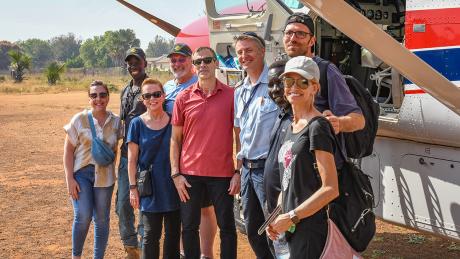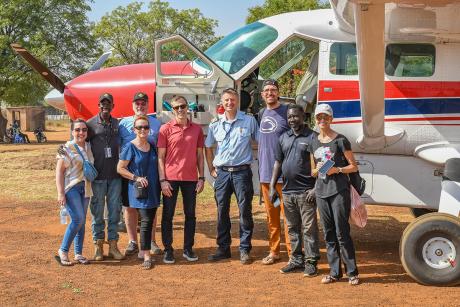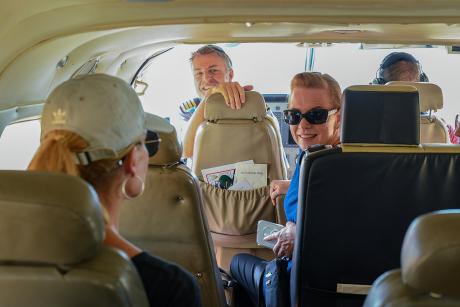
A team from Petros Network recently brought pastors and evangelists together from across Eastern Equatoria, to attend a five-day training for church planters in Torit. Petros Network Founders Ray and Linda Noah, shared about their work as they waited to board the plane.
Petros Network hopes to strengthen the church in South Sudan through its growing network of church planters – or Peters. ‘Our goal is that our church planters will share the gospel, show the gospel, and spread the gospel,’ explains Petros Network Founder Ray Noah, introducing their approach.
You won’t see Petros Network on any church signs or branding logos. Instead, they work behind the scenes to support the existing church denominations through a three year long training programme covering Bible basics, doctrine, spiritual leadership, and sustainable farming.
We plant churches and it's through those churches, that we do compassion work, whether that’s children's feeding or health care or water or women and girl’s empowerment
Church planters are all locally recruited. They are selected for the programme with the help of trusted local church leaders who look for mature and teachable Christians with the heart for outreach. When they complete their training, they will go back under the church denominations they came from. ‘We're active in eighteen denominations across the evangelical Christian church,’ Linda explains.
The teaching is centred on church planting, Ray shares. ‘We focus on evangelism and turning new converts into fully devoted disciples of Jesus. Winning them is easy. Turning them into disciples is a long-term thing.’

Grassroots gospel
The team from the US have been making regular visits to support the team on the ground since they began working in South Sudan in 2013. They relaunched their church-planter training eighteen months ago, after a hiatus due to insecurity and covid. The initiative has grown from an initial 26 churches to 135 church plants.
‘We have 135 church planters doing a three-year programme, all going out to different churches and different areas where there is a need. Our hope is that every church we plant will multiply two to three times,’ Linda says.
It is a holistic mission which aims to impact the whole community, Linda continues to explain: ‘We plant churches and it's through those churches, that we do compassion work, whether that’s children's feeding or health care or water or women and girl’s empowerment.
In Torit, they have been able to visit the Children's Feeding initiative, which is already up and running. ‘We’re feeding 1019 kids a day. We’re in the process of launching a girl’s programme in Torit with 500 girls and we have 100 women enrolled in a women's empowerment micro-grant program here,’ Linda says.

MAF make this possible for us. If MAF weren't doing this, we couldn't be here.
Sustainable growth
Taban leads the very practical agricultural ministry that helps make the church planting ministry sustainable. ‘This is a good area for farming. Whenever you plant you will get a harvest,’ he says, explaining how church planters and others in the community are shown how to make the most of the resources they have. ‘We have three demonstration farms where people can come and learn about farming. The training is open to everyone. Community people, students, anybody willing, can come and join me and I will train them.
Ray hopes that the impact will be twofold. ’We're trying sustainability projects so that after three years, when our support ends, they're able to be self-sustaining. We’re also trying to help solve the food hunger issue, although it's a big challenge,’ he admits.
As, they wait to board the plane, Linda is enthusiastic as she reflects on everything that Petros Network has been achieved in the last few days. They’ve been able to carry out the training and get a good overview of the support needed going forward.
‘The highlight was seeing the impact of the Children's Feeding initiative, the joy and the interest of the students, how the team have bonded, and the progress they’ve made in just a year. We've always said they don't need a handout. They just need a hand up - which means that they can do the rest. There is a lot of work still to be done but they know what needs to be done,’ Linda reflects.

A Mission with MAF
‘This is the first time I've been able to come to Torit and I was very excited to come,’ Linda says, sharing why mission aviation has such a special significance for her: ‘I grew up in my childhood with an airport just like this, with ten little airplanes around it. Missionaries would come in and dad would fix their airplanes.
‘Being a mission pilot was my dad's dream, so when I first found MAF were flying in South Sudan, I was quite emotional because I just appreciate this ministry so much. When I was watching the pilot fly, I was just like, oh, my goodness my dad would have thought he died and went to heaven, getting to do this!’
Linda reflects on the role of practical ministries in supporting mission. ‘MAF make this possible for us. If MAF weren't doing this, we couldn't be here. This is the first time in ten years I've been allowed to come in here. Because of the security situation they wouldn't let us go on the roads. But when we found MAF and discovered we could fly in, it made it possible to come. MAF is really a powerful ministry and will open up a lot of ministry opportunities for us, both here and in Uganda, and cut down our travel days which would be a great help to us,’ Linda concludes.
